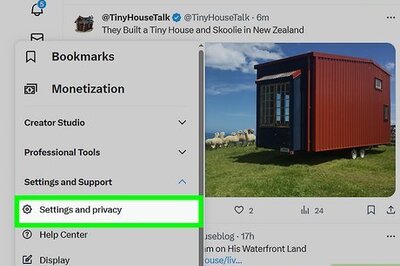
views
In recent years, data science integration with healthcare has revolutionised the industry by facilitating precise analysis, predictive modeling, and evidence-based decision-making. Data analytics applications in the healthcare industry include diagnosing diseases, designing personalised treatment plans, and improving patient outcomes.
Similar to other developed nations, India too extensively integrates data science in the healthcare domain by leveraging state-of-the-art AI-based technologies in diversified healthcare avenues such as for the detection and diagnosis of disease, drug discovery and development, healthcare resource optimisation, precision medicine, and public health surveillance and epidemic forecasting.
Data Science in Healthcare: Contribution During Covid19
One of the best examples from recent history that clearly illustrates how data science made significant contributions to healthcare is during the COVID-19 pandemic. AI algorithms have played a crucial role in the rapid and accurate diagnosis of the coronavirus and have been instrumental in tracking and predicting the spread of the virus.
AI facilitated robust analysis of large-scale healthcare datasets, including epidemiological data, mobility patterns, and social media feeds which in turn assisted both the public and decision-makers. Furthermore, AI-based models allowed forecasting of infection rates, identified high-risk areas, and informed public health interventions.
Eligibility and Skills Required
Data science is one of the critical areas rapidly integrating into the healthcare sector, where data scientists, health data analysts, and health data engineers collectively ensure advancements in patient care.
The data scientists commonly possess expertise in computer science, and computational biology and often leverage statistical techniques, algorithms, and machine learning techniques to extract meaningful insights from complex healthcare data and to build predictive models for clinical decision support systems.
Health data analysts share job responsibilities with data scientists, however, they harbor more expertise in collecting, validating, and analysing electronic health records (EHRs), and clinical trial data and are often involved in providing valuable recommendations to enhance healthcare delivery and outcomes.
Finally, healthcare data engineers are highly specialised in developing and maintaining data infrastructure systems in healthcare organisations. They build data pipelines, manage databases, and ensure data integrity and security.
Since data science in healthcare is a typical example of an interdisciplinary field, and due to the availability of post-graduation diplomas/degree programmes in the Indian education sector, the eligibility requirements for a data science professional programme are highly heterogeneous. In most cases, a bachelor’s or master’s degree in data science, computer science, statistics, bioinformatics, or a related discipline is considered acceptable.
However, due to the availability of post-graduation diplomas/degree programmes, there is also scope for non-computer science graduates to adopt data science via these programmes. Notably, programming and statistics constitute the core of data science, so proficiency in these fields is always advantageous in data science. In addition to the basic requirements, a solid understanding of healthcare systems, medical terminologies, and clinical workflows is always beneficial.
Salary Expectations
The salary expectations for data scientists, health data analysts, and health data engineers vary based on job role, experience, location, and organisation. Importantly, due to the rapid data science boom in recent years, even the entry-level salaries for these jobs are typically around 10 lakhs INR/annum, while experienced professionals can expect anything above 15 lakhs INR/annum. It is important to note that these salary ranges are approximate figures and can vary significantly depending on individual skills, qualifications, and the organisation’s size and reputation.
— Written by Debarka Sengupta, Associate Professor (CB, CSE), and Gaurav Ahuja, Associate Professor (CB), IIIT-Delhi


















Comments
0 comment